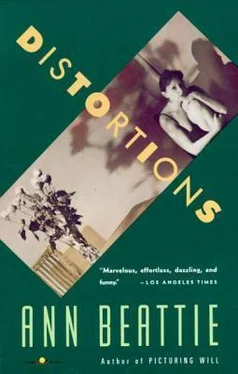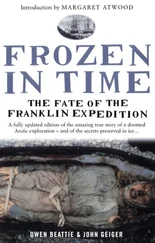Ann Beattie - Distortions
Здесь есть возможность читать онлайн «Ann Beattie - Distortions» весь текст электронной книги совершенно бесплатно (целиком полную версию без сокращений). В некоторых случаях можно слушать аудио, скачать через торрент в формате fb2 и присутствует краткое содержание. Год выпуска: 1991, Издательство: Vintage, Жанр: Современная проза, на английском языке. Описание произведения, (предисловие) а так же отзывы посетителей доступны на портале библиотеки ЛибКат.
- Название:Distortions
- Автор:
- Издательство:Vintage
- Жанр:
- Год:1991
- ISBN:нет данных
- Рейтинг книги:5 / 5. Голосов: 1
-
Избранное:Добавить в избранное
- Отзывы:
-
Ваша оценка:
- 100
- 1
- 2
- 3
- 4
- 5
Distortions: краткое содержание, описание и аннотация
Предлагаем к чтению аннотацию, описание, краткое содержание или предисловие (зависит от того, что написал сам автор книги «Distortions»). Если вы не нашли необходимую информацию о книге — напишите в комментариях, мы постараемся отыскать её.
Distortions — читать онлайн бесплатно полную книгу (весь текст) целиком
Ниже представлен текст книги, разбитый по страницам. Система сохранения места последней прочитанной страницы, позволяет с удобством читать онлайн бесплатно книгу «Distortions», без необходимости каждый раз заново искать на чём Вы остановились. Поставьте закладку, и сможете в любой момент перейти на страницу, на которой закончили чтение.
Интервал:
Закладка:
“Who’s paying for it?” Mary asks automatically.
He makes a crude joke. There is loud music; it gets so loud that she blocks it out. Two people come in in raincoats. Wind blows across the floor; the wind is blowing so hard that they have to force the door shut behind them. Mary is glad when the door is closed. She is tired of looking at snow. The four stained-glass squares in the top of the door shine brightly. The street light outside illuminates them. Mary is listening to the music, looking at the colors. There aren’t many people. Sam tells Beverly to go home early. Beverly makes another phone call, comes back to the table for last orders. The people in the raincoats are telling some other people that it’s not their dog. There is a large brown-and-white dog in Sam’s; it is wet, confused, stopping to shake itself, then running forward to sniff under a table. Mary recognizes the dog — it belongs to her uncle. But the dog doesn’t recognize Mary. It runs forward to sniff under another table. Beverly goes after the dog, intending to lead it outside. One of the boys watches what’s going on through the space in his hand, then goes after Beverly with his arms out, grabs her from behind, lets her go. Then the boy grabs the dog. Sam is talking to Beverly.
“I told you,” he says. “It’s Marshall’s dog. Call Marshall.”
“The boy took it.”
“Tell Marshall.”
Beverly shrugs. Sam can be as unreasonable as a drunk. Years ago she was going to get away from all this. She looks up Marshall’s number. She stares at the last name. Then she dials him. The phone rings and rings, no answer. Later, when Marshall does answer the phone, they’ll tell him his dog is dead.
*
The boy runs out of the restaurant, into the snow. He hadn’t realized how warm it was in Sam’s. He left his jacket behind. He is shivering. The dog is shivering, trying to jump out of his arms. He sees the streetlight; the light is higher and higher above him. He has fallen. The dog is gone. There is a noise, a thump, the noise he makes falling into the snow, the noise the dog makes running into the car. There is someone else outside Sam’s with him. Miriam. Miriam is just walking in the snow. He smiles at her — he waited all night to see Miriam, and now she’s here, walking in the snow. There are more lights — car headlights as well as the streetlight. Miriam’s car is stopped in the middle of the street. Miriam is kneeling in front of it, then walking back and forth, shaking him, lying there in the snow. It’s noisy — as noisy as it was inside, but it’s all Miriam! She’s calling Beverly, but Beverly’s already there, and she doesn’t have a jacket either. The door opens and closes. More snow blows into Sam’s. There is cold snow all around him.
“He took it.”
“Tell Marshall.”
Beverly shudders. She runs into the restaurant.
“Forget it,” Sam calls after her. “I’ll call him.”
“What about the boy?” Miriam whispers to Sam.
Sam knocks some snow off the heel of his boot.
“Snow’ll sober him up.”
Downhill


Walking the dog at 7:30 A.M., I sit on the wet grass by the side of the road, directly across from the beaver pond and diagonally across from the graveyard. In back of me is a grapevine that I snitch from. The grapes are bitter. The dog lifts a leg on the gravestone, rolls in dead squirrel in the road, comes to my side finally — thank God none of the commuters ran over him — and licks my wrist. The wet wrist feels awful. I rub it along his back, passing it off as a stroke. I do it several times. “Please don’t leave me,” I say to the dog, who cocks his head and settles in the space between my legs on the grass.
*
My mother writes Jon this letter:
“Oh, John, we are so happy that September marks the beginning of your last year in law school. My husband said to me Saturday (we were at the Turkish restaurant we took you and Maria to when she was recuperating — the one you both liked so much) that now when he gets mad he can say, ‘I’ll sue!’ and mean it. It has been uphill for so long, and now it will be downhill.”
Curiously, that week an old friend of Jon’s sent us a toy — a small bent-kneed skier who, when placed at the top of a slanting board, would glide to the bottom. I tried to foul up the toy every which way. I even tried making it ski on sandpaper, and it still worked. I tacked the sandpaper to a board, and down it went. The friend had bought it in Switzerland, where he and his wife were vacationing. So said the note in the package that was addressed to Jon, which I tore open because of the unfamiliar handwriting, thinking it might be evidence.
*
Why do I think Jon is unfaithful? Because it would be logical for him to be unfaithful. Some days I don’t even comb my hair. He must leave the house and see women with their hair clean and brushed back from their faces, and he must desire them and then tell them. It is only logical that if he admires the beauty of all the women with neatly arranged hair, one of them will want him to mess it up. It is only logical that she will invite him home. That smile, that suggestion from a woman would lure him as surely as a spring rain makes the earthworms twist out of the ground. It is even hard to blame him; he has a lawyer’s logical mind. He remembers things. He would not forget to comb his hair. He would certainly not hack his hair off with manicuring scissors. If he cut his own hair, he would do it neatly, with the correct scissors.
“What have you done?” Jon whispered. Illogical, too, for me to have cut it in the living room — to leave the clumps of curls fallen on the rug. “What have you done?” His hands on my head, feeling my bones, the bones in my skull, looking into my eyes. “You’ve cut off your hair,” he said. He will be such a good lawyer. He understands everything.
*
The dog enjoys a fire. I cook beef bones for him, and when he is tired of pawing and chewing I light a fire, throwing in several gift pinecones that send off green and blue and orange sparks, and I brush him with Jon’s French hairbrush until his coat glows in the firelight. The first few nights I lit the fire and brushed him, I washed the brush afterward, so Jon wouldn’t find out. The doctors would tell me that was unreasonable: Jon said he would be gone a week. A logical woman, I no longer bother with washing the brush.
*
I have a scotch-and-milk before bed. The fire is still roaring, so I bring my pillow to the hearth and stretch out on the bricks. My eyelids get very warm and damp — the way they always did when I cried all the time, which I don’t do any more. After all, this is the fifth night. As the doctors say, one must be adaptable. The dog tires of all the attention and chooses to sleep under the desk in the study. I have to call him twice — the second time firmly — before he comes back to settle in the living room. And when my eyes have been closed for five minutes he walks quietly away, back to the kneehole in the desk. At one time, Jon decided the desk was not big enough. He bought a door and two filing cabinets and made a new desk. The dog, a lover of small, cramped spaces, wandered unhappily from corner to corner, no longer able to settle anywhere. Jon brought the old desk back. A very kind man.
*
Like Columbus’ crew, I begin to panic. It has been so long since I’ve seen Jon. Without him to check on me, I could wander alone in the house and then disappear forever — just vanish while rounding a corner, or by slipping down, down into the bathwater or up into the draft the fire creates. Couldn’t that pull me with it — couldn’t I go, with the cold air, up the chimney, arms outstretched, with my cupped hands making a parasol? Or while sitting in Jon’s chair I might become smaller — become a speck, an ash. The dog would sniff and sniff, and then jump into the chair and settle down upon me and close his eyes.
Читать дальшеИнтервал:
Закладка:
Похожие книги на «Distortions»
Представляем Вашему вниманию похожие книги на «Distortions» списком для выбора. Мы отобрали схожую по названию и смыслу литературу в надежде предоставить читателям больше вариантов отыскать новые, интересные, ещё непрочитанные произведения.
Обсуждение, отзывы о книге «Distortions» и просто собственные мнения читателей. Оставьте ваши комментарии, напишите, что Вы думаете о произведении, его смысле или главных героях. Укажите что конкретно понравилось, а что нет, и почему Вы так считаете.












